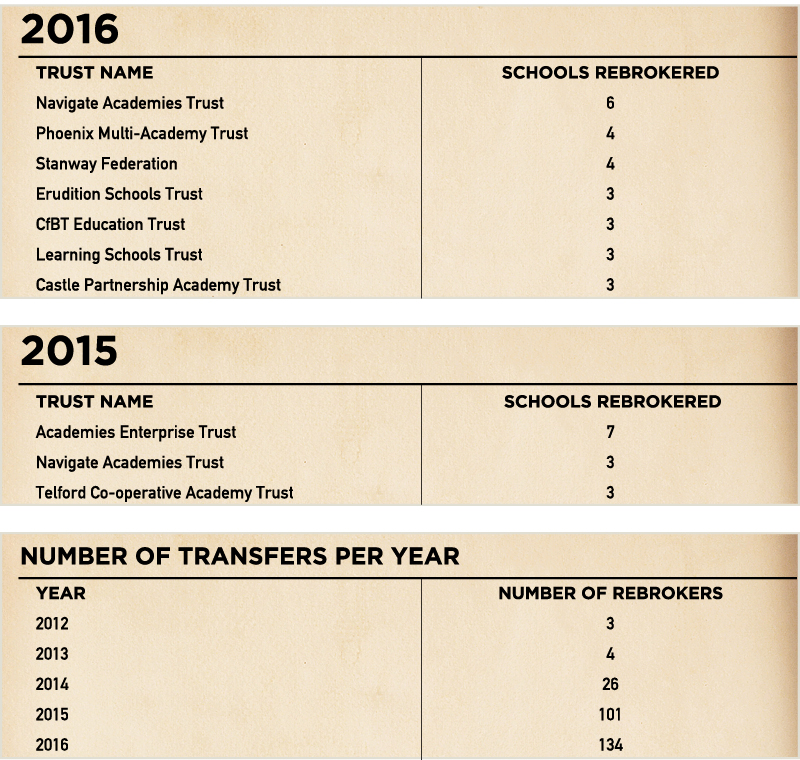More than 100 schools are now rebrokered every year as the booming academy transfer market pushes costs to a potential £30 million.
Figures obtained by Schools Week have revealed 235 academies were handed to new trusts in the past two calendar years, up from just 26 in 2014.
Rebrokering costs are not routinely published, but previous figures showed the average cost of the transfers made between 2013-14 was £131,000.
If this was rolled out across the past two years, the total cost would amount to more than £30 million.
However, the true figure is likely to be lower after last year’s Education and Adoption Act smoothed the way for the government to intervene quickly to strip under-performing trusts of academies.
Education leaders want the government to pull back on such “disruptive” transfers, which often include a name change, new uniform and an overhaul of leadership.
Malcolm Trobe, interim general secretary of the Association of School and College Leaders, said: “The process has to be well thought out, and enacted quickly to ensure the rebrokered academy is rapidly able to be given the required level of support.”
But the process can still be drawn out.
This would remove some of the bureaucracy around it, and encourage partnerships that truly work for schools
In December 2015 the government told the Sandhill Multi-Academy Trust that it did not have the capacity to improve its two schools and that it would be wound up. The schools were finally transferred in October last year.
Rebrokering costs are often made up of sweeteners to entice new trusts, including funds to cover budget deficits and school improvement.
Russell Hobby, general secretary of the National Association of Head Teachers, suggested “more careful growth at the start” and for schools to be given the right to leave a trust if they felt it was not performing – a similar proposal to the “parental trigger” proposed by the New Schools Network when it was headed by Nick Timothy, now joint chief of staff at No 10.
“This would remove some of the bureaucracy around it, and encourage partnerships that truly work for schools.”
The Department for Education (DfE) said rebrokerage was not always an indication of poor performance and could include academies moving into a multi-academy trust.
The Navigate Academies Trust lost nine schools over two years – the most of any trust. It is one of at least 11 trusts that have been wound up.
Three of its schools left in September 2015 to set up their own trust, while the remaining six joined other trusts in May last year.
Academies Enterprise Trust, the country’s largest chain, offloaded seven schools in 2015 after concerns that it had expanded too quickly.

The figures also reveal an emerging “MAT merger” market – something that the national schools commissioner Sir David Carter expects to see more often.
Three schools belonging to the Castle Partnership Academy Trust were transferred to the Samuel Ward trust, both in Suffolk, in December last year. But the merger has cut local choice; most schools in Haverhill are now run by Samuel Ward.
A DfE spokesperson said most academies were improving outcomes, some after “years of stagnation”.
“But we do not tolerate failure and the strength of the academy programme is that it allows us to intervene swiftly, including replacing sponsors where it is in the best interests of children.”
The number of transfers is also expected to rise as the number of academies increases.









Thank goodness there’s so much money in the education budget that these sums will not be noticed.
Is the school transfer market becoming like that of the football league?
Will outstanding schools wanting to join a chain, start to employ their own agents to obtain the best deal? We already have rich sponsors owning MATs just like they own football clubs. Super managers like Regional Schools Commissioners are being bought up by MATs (50% of RSCs so far).
Poorer performing schools are relegated so that no MAT wants to buy them.
All the money in “the game” is gravitating to the top and little money is left for grass roots education.
The poorer teams are left with part time professionals called teaching assistants. The richer clubs have season ticket “requests” and expensive uniforms which exclude poorer families who find it a struggle to purchase them.
Rupert Murdoch changed football with Sky TV sponsorship. Michael Gove is back in Rupert’s arms, so how long before English Education becomes part of “the glorious game”? Get your Sky Education Subscription now and your child can have full colour, HD learning in a Premier School.
Hilarious ‘journalism’!!!
Sexy eye-catching headline: “Booming academy transfer market pushes costs to potential £30m”
Fifth paragraph in: “However, the true figure is likely to be lower”.
Yet again an important issue obscured by sensationalism.
The key word was ‘potential’. The truth is, we don’t know. The DfE refused my FoI request on the grounds it would publish the figures in the future (this is an allowable excuse under FoI rules). That was on 6 March 2016.
My FoI request to about 70 academy trusts revealed the average transfer cost could be £75k per academy. But my figures omitted the exceptional £6m (that’s right, £6m, for one trust) as it was an outlier. And I can’t vouch for this estimate’s reliability because I had to accept what each trust said they received on rebrokerage (this may not be the same as what the DfE says it is).
You’re right that the issue is important – that’s why I’ve been requesting these figures for two years. It took a First Tier Tribunal to force the DfE to release the cost of transferring 23 academies which changed hands in a twelve month period. The DfE appears to be dragging its feet on this issue.
Well if no-one knows then it’s irresponsible to publish with a headline such as this.
If someone wanted to help in the understanding of this issue, they would explain what is actually covered by this wonderfully vague catch-all reference to ‘rebrokerage costs’. Unsurprisingly, we have a nice sentence in this article that says “Rebrokering costs are often made up of sweeteners to entice new trusts, including funds to cover budget deficits and school improvement” but how much falls into this category and what else does it cover?
Your comment refers to an average ‘transfer cost’ of £75k, but what does this mean? Are we talking about someone spending £75,000 on legal fees, employment restructuring, hiring more teachers, covering a deficit etc.?
One last comment, as I understand it when a community school becomes an academy then if it is a sponsored conversion (e.g. because the school is failing and deemed to require substantial investment to turn it around) then the sponsoring MAT receives additional funding. If, instead of it being a first-time conversion it is a rebrokerage then is the same ‘sponsorship’ funding available? And if so, are these sums included in rebrokerage/transfer costs?
The answer is we don’t know what is covered in rebrokerage. The DfE initially refused to give details of transfer costs of 23 academies transferred within a set period on grounds of ‘commercial confidentiality’. As I said above, this was overturned by a First Tier Tribunal which ruled there was a public interest in the figures being published.
I arrived at the average £75k figure after I received FoI answers from individual academy trusts. I was surprised that some trusts received £0. This raised the question about who paid the legal fees. Others received £25k which was the amount of grant given to community schools when they converted to cover such legal fees. http://www.localschoolsnetwork.org.uk/2016/05/exclusive-0m-to-65m-the-cost-of-academy-transfers
Reasons given for receiving higher amounts included reimbursement for statutory redundancies, school improvement grant, replication of previous post opening grant, refurbishment of IT facilities, environmental improvement grant, repayable loans to cover all or part of operating deficit of predecessor academy and money for additional teaching time. There is no pattern.
Your question re whether ‘sponsorship’ funding is included is a good one. The truth is, we don’t know. Two MATs told me they’d received £75k but said it wasn’t rebrokerage but DfE ‘capacity funding’. One of these MATs told me it wasn’t linked to transfer but the other told me the ‘capacity fund’ covered legal fees, auditors and IT licences.
That’s why it’s essential the DfE publishes the figures. I received a reply from Lord Nash yesterday via my MP saying the figures would be published shortly after the DfE had collated the figures. It’s unclear how long it will take for them to collate the data – I’ve been waiting since 6 March 2016.
I agree it’s all highly unclear. But once again I would say that if that’s the case then writing an article that trumpets “academy transfer market pushes costs to potential £30m” is misleading.
I read the article on your website you refer to – again you refer to DfE paying “transfer fees” within the range of £0 to £6.5 million. There is very little in the way of explanation of what this means.
Another way of interpreting the figures in your article is to say that 40% of the rebrokered academies transferred without any payments being made whatsoever. How surprising that the article above doesn’t make any sort of reference to this …
Mark – as with everything to do with transfers, the £0 rebrokerage isn’t as simple as an academy being transferred from one academy trust to another at nil cost. For example, a small number of early academies were co-sponsored. If one, or more, of the co-sponsors dropped out, this was recorded as a ‘transfer’ with £0 fee. In another case, that of five academies linked to Barnfield Federation, the EFA ruled they should move out of the Federation after financial discrepancies were found. But, due to the complex way in with Barnfield Federation was set up, the trust running the academies, Barnfield Academy Trust, was a subsidiary of the Federation. It merely changed its name to Shared Learning Trust. This, again, was recorded as a transfer at £0 per academy. If that weren’t enough to confuse the issue, ARK said their ARK All Saints Academy wasn’t a transfer from St Michael and All Angels’ CoE Academy as the DfE claimed. ARK said the predecessor school was closed and the pupils dispersed. ARK opened its new academy on the site. ARK says there were, therefore, no rebrokerage fees (but it’s likely it received money to set up a new academy).
There’s also the problem you’ve identified about whether ‘rebrokerage’ includes academy trust start up grants. For example, Lydiate Learning Trust, which took over Childwall Sports and Science Academy, told me they received £75k but this wasn’t for taking over Childwall. It was to become Lydiate Learning Trust. Bright Futures told me it received £600k when it took over Wigan UTC but this was not rebrokerage but to replicate the previous post opening grants. I recorded these as £0 in my figures.
A further problem, which again you have identified, is whether a legal fee grant is rebrokerage or not. For example, Bedford College told me it received nothing for taking over Central Bedfordshire UTC but admitted they had received £25k to cover legalities.
Given these anomalies and the fact that I omitted the £6.5m outlier from my calculations mean the average transfer fee would likely be more than £75k per academy especially if we omit ‘transfers’ which were only transfers on paper.